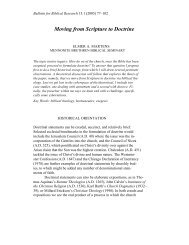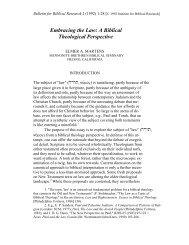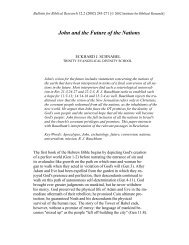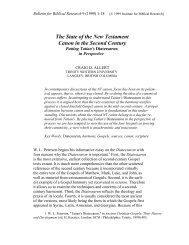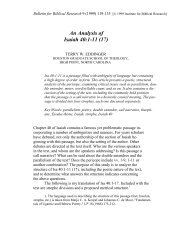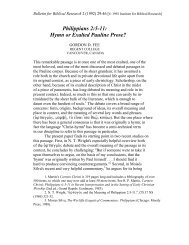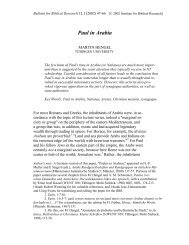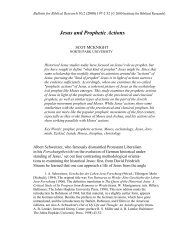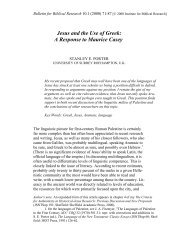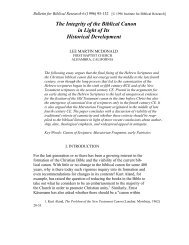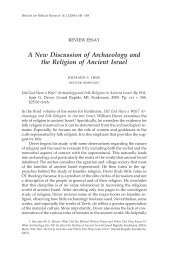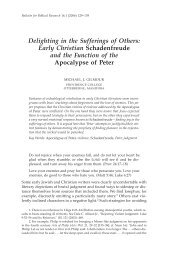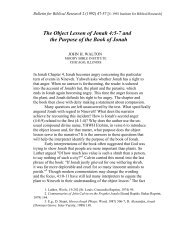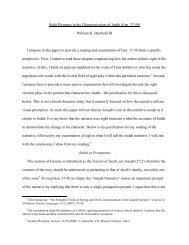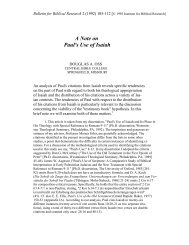Nota Bene-- C:\DOCUME~1\XPMUSER\MYDOCU~1\NBFILE~1 ...
Nota Bene-- C:\DOCUME~1\XPMUSER\MYDOCU~1\NBFILE~1 ...
Nota Bene-- C:\DOCUME~1\XPMUSER\MYDOCU~1\NBFILE~1 ...
Create successful ePaper yourself
Turn your PDF publications into a flip-book with our unique Google optimized e-Paper software.
17<br />
consisting of a non-Semitic element and a Yahwistic theophoric. 35 This understanding yields<br />
something like “Yah is Lord” or “Yah is great.” 36 Mazar (1986, 136–137) for precedence points<br />
to the Arawnah-Awarnah 37 of Jerusalem as a Hurrian title based on the genitive euri-ne, yielding<br />
a shortened “Lord of X” or simply “Lord” (i.e., a feudal lord). 38 Reminiscent in the same location<br />
is the Amarna age ruler of Jerusalem with the Mischname Abdi-H˘ eba (“Servant of the goddess<br />
H˘ ebat”) 39 exhibiting a Semitic element plus a Hurrian theophoric.<br />
Whether Uriah, the Arawnah-Awarnah, and Abdi-H˘ eba can be organically connected<br />
remains to be demonstrated, but the Jerusalem connection of the latter two as rulers of the same<br />
location, the Semitic-Hurrian onomastics of Abdi-H˘ eba, and David’s connection to the first two<br />
suggest that the Hurrian-Semitic onomastics should be taken seriously for Uriah. Further<br />
supporting the name “Uriah” as Hurrian-Semitic are the following observations: other non-<br />
Israelites in David’s service bear non-Israelite names (e.g., the likely Hurrian<br />
———————————<br />
35 For an extensive argument favoring a compound consisting of the Luwian adjective and Israelite<br />
theophoric, see Arbeitman (1982).<br />
36 Though it does not appear to occur in PNs, uri- could be a shortened form of the Hurrian adjective urh˘ i,<br />
“true, faithful” (see Laroche 1980, 286). The fuller form occurs frequently in PNs such as Urh˘ i-Tešub, Urh˘ i-Tilla,<br />
Urh˘ i-Kušuh˘ , Urh˘ i-tarmi, and Urh˘ iya(na). In its possible application to “Uriah,” the result yields something like<br />
“Yah is true/faithful”— an intriguing irony in the David-Bathsheba-Uriah triangle.<br />
37 The variations in the MT’s orthography are not surprising in light of the appellation’s foreign derivation<br />
(2 Sam 24): האורנה K הארונה) Q; v. 16), ארניה K ארונה) Q; v. 18), ארונה 7x (vv. 20–24). The Chronicler spells the<br />
name ארנן which the LXX consistently adopts via Ορνα. The variation ארונה/האורנה also appears in the regular<br />
metathesis of ewri-erwi in the eastern and western (Nuzi) dialects. The first occurrence in the MT bears the article,<br />
suggesting that Arawnah-Awarnah is a title rather than a personal name. Second Samuel 24:23 supports a titular<br />
understanding if Mazar’s passing suggestion (1986, 136) is correct in reading המלך as an appositive rather than a<br />
vocative: “All this did Arawnah the king give to the king” ֹּכל ָנַתן ֲאַרְוָנה ַהֶּמֶלְך ַלֶּמֶלְך) .(ַה By understanding the sentence<br />
as narrative rather than continued discourse of the Arawnah, this reading has the added advantage of removing the<br />
awkwardness of a personal self-reference given to David the king rather than an expected “your servant” or similar.<br />
38 Speiser (1941, 98–101) explicates the -ne suffix as essentially indefinite in force, where its various<br />
nuances are traced to a base meaning of “one” used as a relative particle. Hence, it can take on definite force or<br />
function as an attributive particle for a following noun. In application to Euri-ne its force literally indicates “lord,<br />
one of X (land/town/city).” While Mazar supposes an intentional shift in the title to make it sound more Israelite, it<br />
is also possible the MT has simply masked the -ne with a late vocalization of -nâ.<br />
39 E.g., EA 280:16–24, 30–35; 285:1–4; 286:1–4, 5–15, 61–64; 287:1–3, 64–70; 288:1–4, 62–66; 289:1–<br />
4, 45–51; 290:1–4, 14–21; 366:20–28.<br />
˘<br />
˘



